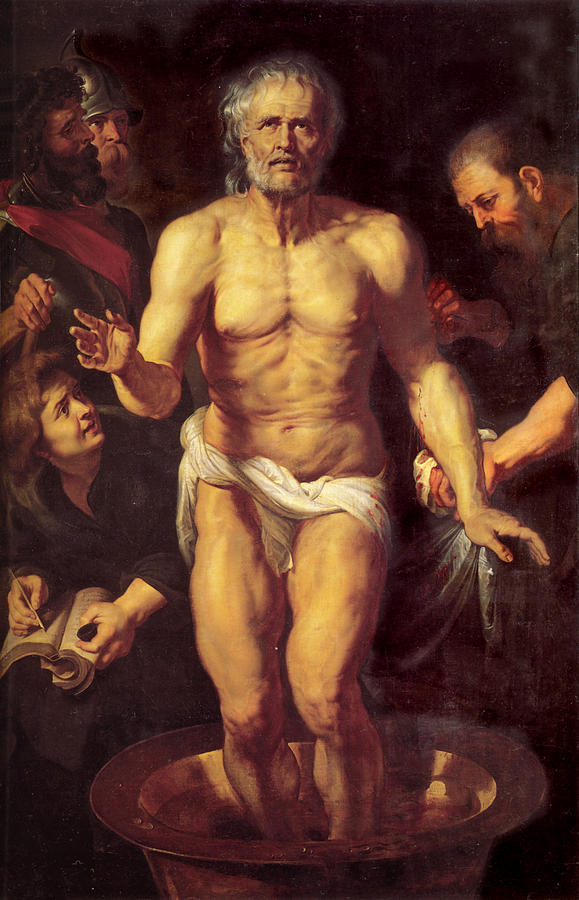
Lucius Annaeus Seneca, known simply as Seneca (or Seneca the Younger), was a stoic philosopher and rhetorician. He’s one of the first stoics for which there are considerable literary remains for us to study.
Born over 2,000 years ago in Spain as the son of Seneca the Elder, Seneca had a mixed reputation.
On one hand, we have his writings, which were both practical and timeless. Using a search for wisdom to navigate the inevitable ups and downs of life, he could be considered a practical philosopher. His thoughts influenced historical figures such as Pascal, Francis Bacon, and Montaigne, and continue to resonate with people today. Nassim Taleb went so far as to write an entire chapter on Seneca in his book AntiFragile.
“We are not given a short life but we make it short, and we are not Ill-supplied but wasteful of it.”
— Seneca
On the other hand, there is the incongruity between his principles and his life. Take, as one of many examples, his association with Nero. In 41 A.D. when Claudius became the emperor, he exiled Seneca to the island of Corsica. This is where he stayed for over eight years, until Agrippina, the mother of the future emperor Nero, secured his release to become Nero’s tutor. Nero would go on to become one of the most tyrannical emperors in the Roman Empire, a fact that caused many people to charge Seneca with hypocrisy — how can one with so much wisdom tutor Nero!?
Serving any bad guy — especially Nero — is prosperous until it’s not. While Seneca got wealthy, he also got dead. Nero, thinking Seneca was plotting to overthrow him, ordered him killed. (He ended up having to kill himself.)
Like most of us, Seneca lived through ups and downs. While I’ve never been exiled to an island or tutored a tyrannical emperor, I am divorced and I worked for someone I didn’t respect. This is how I first came to discover stoic philosophy, and it changed my life.
Seneca and another famous stoic, Marcus Aurelius, used philosophy to live. They wanted to know how to use wisdom to navigate the inevitable pitfalls of life. The lessons you can draw from these works are timeless — that’s why we still read them today.
Seneca Quotes
Here are some of our favorite quotes from Seneca. Hopefully, they’ll inspire you to dig a little deeper into the mind of this great thinker. (I’ve included some of his recommended works below.)
“Time discovers truth.” — Seneca
“A gem cannot be polished without friction, nor a man perfected without trials.” — Seneca
“Wherever there is a human being, there is an opportunity for a kindness.” — Seneca
“We are more often frightened than hurt; and we suffer more from imagination than from reality.” — Seneca
“A gift consists not in what is done or given, but in the intention of the giver or doer.” — Seneca
“All cruelty springs from weakness.” — Seneca
“As is a tale, so is life: not how long it is, but how good it is, is what matters.” — Seneca
“If a man knows not to which port he sails, no wind is favorable.” — Seneca
“He suffers more than necessary, who suffers before it is necessary.” — Seneca
“Timendi causa est nescire — Ignorance is the cause of fear.” — Seneca
“It does not matter what you bear, but how you bear it.” — Seneca
“The man who has anticipated the coming of troubles takes away their power when they arrive.” — Seneca
“The whole future lies in uncertainty: live immediately.” — Seneca
Notable Works
Epistulae Morales (Letters from a Stoic) — A collection of short moral letters addressed to Lucilius and discussing a wide range of philosophical topics, such as grief, wealth, anger, success, failure, and jealousy.
De Brevitate Vitae (On the Shortness of Life) — This might be the quickest introduction to Seneca, covering a topic many of us feel we understand but don’t: time.
De Clementia (On Mercy) — A treatise, written to Nero, on blood, happiness, and anger.
Suggested Readings
Seneca on The Shortness of Time — Time is invisible so it’s easy to spend without proper consideration to its value. Seneca offers a warning on how we squander our time only to regret it.
The Stoic Reading List: Aurelius, Seneca, Epictetus, and More — A detailed look at where to start your introduction to stoicism.
Seneca on Clemency, Blood, Happiness, and Anger — Seneca addresses De Clementia to the young Roman emperor Nero, with the aim of depicting the ideal ruler. Susanna Braund goes to great lengths to establish the literary, philosophical, and political traditions that influenced the work.
Seneca on Gathering Ideas and Combinatorial Creativity — Ruminating on the necessity of both reading and writing, so as not to confine ourselves to either, Seneca advised in one of his Epistles that we engage in combinatorial creativity — that is, gather ideas, sift them, and combine them into a new creation.
Seneca on the One Thing Nature Loans Us That We Cannot Repay — The Roman philosopher Seneca weaved wisdom into letters to his friends. This one to Lucilius explores the one thing nature loans us that we squander: time.
The Wisdom of Seneca: A Lawyer’s Advice for Life in the Fast Lane — Seneca provides some ancient advice for life in the modern fast lane and helps us rethink our perspectives in the process.
